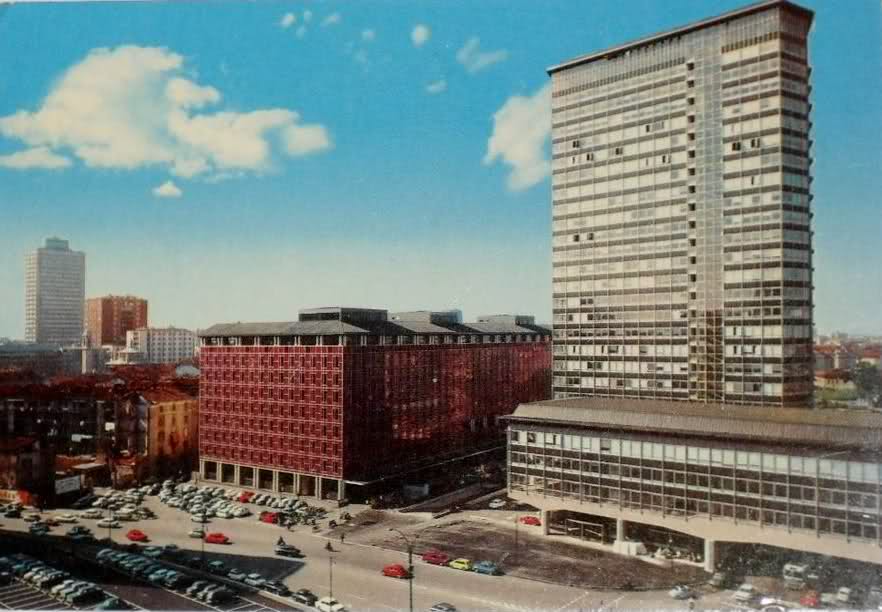|
Thirty Glorious Years
''Les Trente Glorieuses'' (; 'The Glorious Thirty') was a thirty-year period of economic growth in France between 1945 and 1975, following the end of the Second World War. The name was first used by the French demographer Jean Fourastié, who coined the term in 1979 with the publication of his book ''Les Trente Glorieuses, ou la révolution invisible de 1946 à 1975'' ('The Glorious Thirty, or the Invisible Revolution from 1946 to 1975'). The term is derived from '' Les Trois Glorieuses'' ('The Glorious Three'), the three days of revolution on 27–29 July 1830 in France. As early as 1944, Charles de Gaulle introduced a dirigiste economic policy, which included substantial state-directed control over a capitalist economy. This was followed by thirty years of unprecedented growth, known as the ''Trente Glorieuses''. Over this thirty-year period, France's economy grew rapidly like economies of other developed countries within the framework of the Marshall Plan, such as West Ger ... [...More Info...] [...Related Items...] OR: [Wikipedia] [Google] [Baidu] |
France
France (), officially the French Republic ( ), is a country primarily located in Western Europe. It also comprises of overseas regions and territories in the Americas and the Atlantic, Pacific and Indian Oceans. Its metropolitan area extends from the Rhine to the Atlantic Ocean and from the Mediterranean Sea to the English Channel and the North Sea; overseas territories include French Guiana in South America, Saint Pierre and Miquelon in the North Atlantic, the French West Indies, and many islands in Oceania and the Indian Ocean. Due to its several coastal territories, France has the largest exclusive economic zone in the world. France borders Belgium, Luxembourg, Germany, Switzerland, Monaco, Italy, Andorra, and Spain in continental Europe, as well as the Netherlands, Suriname, and Brazil in the Americas via its overseas territories in French Guiana and Saint Martin. Its eighteen integral regions (five of which are overseas) span a combined area of and contain clos ... [...More Info...] [...Related Items...] OR: [Wikipedia] [Google] [Baidu] |
Departments Of France
In the administrative divisions of France, the department (french: département, ) is one of the three levels of government under the national level (" territorial collectivities"), between the administrative regions and the communes. Ninety-six departments are in metropolitan France, and five are overseas departments, which are also classified as overseas regions. Departments are further subdivided into 332 arrondissements, and these are divided into cantons. The last two levels of government have no autonomy; they are the basis of local organisation of police, fire departments and, sometimes, administration of elections. Each department is administered by an elected body called a departmental council ( ing. lur.. From 1800 to April 2015, these were called general councils ( ing. lur.. Each council has a president. Their main areas of responsibility include the management of a number of social and welfare allowances, of junior high school () buildings and technica ... [...More Info...] [...Related Items...] OR: [Wikipedia] [Google] [Baidu] |
Wirtschaftswunder
The ''Wirtschaftswunder'' (, "economic miracle"), also known as the Miracle on the Rhine, was the rapid reconstruction and development of the economies of West Germany and Austria after World War II (adopting an ordoliberalism-based social market economy). The expression referring to this phenomenon was first used by ''The Times'' in 1950. Beginning with the replacement of the Reichsmark with the Deutsche Mark in 1948 as legal tender (the Schilling was similarly re-established in Austria), a lasting era of low inflation and rapid industrial growth was overseen by the government led by West German Chancellor Konrad Adenauer and his Minister of Economics, Ludwig Erhard, who went down in history as the "father of the West German economic miracle." In Austria, efficient labor practices led to a similar period of economic growth. The era of economic growth raised West Germany and Austria from total wartime devastation to developed nations in modern Europe. At the founding of ... [...More Info...] [...Related Items...] OR: [Wikipedia] [Google] [Baidu] |
Spanish Miracle
The Spanish miracle ( es, el milagro español) refers to a period of exceptionally rapid development and growth across all major areas of economic activity in Spain during the latter part of the Francoist regime, from 1959 to 1974, in which GDP averaged a 6.5 percent growth rate per year, and was itself part of a much longer period of an above average GDP growth rate from 1951 to 2007. The economic boom came to an end with the 1970s international oil and stagflation crises that disrupted the industrialised world although several scholars have argued that "liabilities accumulated during years of frenzied pursuit of economic development" were in fact to blame for the slow economic growth of the late 1970s. Initiation of boom The "economic miracle" was initiated by the reforms promoted by the so-called technocrats who, with Francisco Franco's approval, put in place policies developed in Spain. The technocrats, many of whom were members of Opus Dei, were a new breed of politic ... [...More Info...] [...Related Items...] OR: [Wikipedia] [Google] [Baidu] |
Record Years
The record years ( sv, Rekordåren) is a period in the economy of Sweden, dating from the international post–World War II economic expansion to the 1973 oil crisis, and largely coinciding with the mandates of prime ministers Tage Erlander and earliest years of Olof Palme. The concept was originally a satirical left-wing description of the years 1968–70. Sweden had maintained neutrality during both world wars, and entered the post-war boom with industrial and demographic advantages. Sweden also received aid from the Marshall Plan. Between 1947 and 1974, the Swedish economy grew at an average rate of 12.5% annually. The urban population, living in towns of over 15,000 people, grew from 38% of the total population in 1931 to 74% by 1973. Sustained by an export boom of automobiles, heavy machinery, electronics, shipbuilding, and heavy weapons, the per capita income increased by as much as 2,000%. Sweden had successfully moved into the high-income group of countries by 1955–56. ... [...More Info...] [...Related Items...] OR: [Wikipedia] [Google] [Baidu] |
Post–World War II Economic Expansion
The post–World War II economic expansion, also known as the postwar economic boom or the Golden Age of Capitalism, was a broad period of worldwide economic expansion beginning after World War II and ending with the 1973–1975 recession. The United States, the Soviet Union and Western European and East Asian countries in particular experienced unusually high and sustained growth, together with full employment. Contrary to early predictions, this high growth also included many countries that had been devastated by the war, such as Japan ( Japanese economic miracle), West Germany and Austria ( Wirtschaftswunder), South Korea ( Miracle on the Han River), Belgium (Belgian economic miracle), France ( Trente Glorieuses), Italy ( Italian economic miracle) and Greece (Greek economic miracle). Even countries that were relatively unaffected by the war such as Sweden ( Record years) experienced considerable economic growth. The boom established the conditions for a larger series of gl ... [...More Info...] [...Related Items...] OR: [Wikipedia] [Google] [Baidu] |
Italian Economic Miracle
The Italian economic miracle or Italian economic boom ( it, il miracolo economico italiano) is the term used by historians, economists, and the mass media to designate the prolonged period of strong economic growth in Italy after the Second World War to the late 1960s, and in particular the years from 1958 to 1963. This phase of Italian history represented not only a cornerstone in the economic and social development of the country—which was transformed from a poor, mainly rural, nation into a global industrial power—but also a period of momentous change in Italian society and culture. As summed up by one historian, by the end of the 1970s, "social security coverage had been made comprehensive and relatively generous. The material standard of living had vastly improved for the great majority of the population." History After the end of World War II, Italy was in ruins and occupied by foreign armies, a condition that worsened the chronic development gap towards the more adva ... [...More Info...] [...Related Items...] OR: [Wikipedia] [Google] [Baidu] |
Japanese Post-war Economic Miracle
The Japanese economic miracle refers to Japan's record period of economic growth between the post-World War II era and the end of the Cold War. During the economic boom, Japan rapidly became the world's second-largest economy (after the United States). By the 1990s, Japan's population demographics had begun to stagnate, and the workforce was no longer expanding as quickly as it had in the previous decades despite per-worker productivity remaining high. Background This economic miracle was the result of post-World War II Japan and West Germany benefitting from the Cold War. The American government reformed Japanese society during the occupation of Japan, making political, economic and civic changes. It occurred chiefly due to the economic interventionism of the Japanese government and partly due to the aid and assistance of the U.S. aid to Asia. After World War II, the U.S. established a significant presence in Japan to slow the expansion of Soviet influence in the Paci ... [...More Info...] [...Related Items...] OR: [Wikipedia] [Google] [Baidu] |
Economic History Of France
Economic history of France since its late-18th century Revolution was tied to three major events and trends: the Napoleonic Era, the competition with Britain and its other neighbors in regards to 'industrialization', and the 'total wars' of the late-19th and early 20th centuries. Medieval France The collapse of the Roman Empire unlinked the French economy from Europe. Town and city life and trade declined and society became based on the self-sufficient manor. What limited international trade existed in the Merovingian age — primarily in luxury goods such as silk, papyrus, and silver — was carried out by foreign merchants such as the Radhanites. Agricultural output began to increase in the Carolingian age as a result of the arrival of new crops, improvements in agricultural production, and good weather conditions. However, this did not lead to the revival of urban life; in fact, urban activity further declined in the Carolingian era as a result of civil war, Arab raids ... [...More Info...] [...Related Items...] OR: [Wikipedia] [Google] [Baidu] |
Thomas Piketty
Thomas Piketty (; born 7 May 1971) is a French economist who is Professor of Economics at the School for Advanced Studies in the Social Sciences, Associate Chair at the Paris School of Economics and Centennial Professor of Economics in the International Inequalities Institute at the London School of Economics. Piketty's work focuses on public economics, in particular income and wealth inequality. He is the author of the best-selling book ''Capital in the Twenty-First Century'' (2013), which emphasises the themes of his work on wealth concentrations and distribution over the past 250 years. The book argues that the rate of capital return in developed countries is persistently greater than the rate of economic growth, and that this will cause wealth inequality to increase in the future. Piketty proposes improving the education systems and considers diffusion of knowledge, diffusion of skills, diffusion of idea of productivity as the main mechanism that will lead to lower in ... [...More Info...] [...Related Items...] OR: [Wikipedia] [Google] [Baidu] |
Capital In The Twenty-First Century
''Capital in the Twenty-First Century'' (french: Le Capital au XXIe siècle) is a book written by French economist Thomas Piketty. It focuses on wealth and income inequality in Europe and the United States since the 18th century. It was initially published in French (as ''Le Capital au XXIe siècle'') in August 2013; an English translation by Arthur Goldhammer followed in April 2014. The book's central thesis is that when the rate of return on capital (''r'') is greater than the rate of economic growth (''g'') over the long term, the result is concentration of wealth, and this unequal distribution of wealth causes social and economic instability. Piketty proposes a global system of progressive wealth taxes to help reduce inequality and avoid the vast majority of wealth coming under the control of a tiny minority. At the end of 2014, Piketty released a paper where he stated that he does not consider the relationship between the rate of return on capital and the rate of economi ... [...More Info...] [...Related Items...] OR: [Wikipedia] [Google] [Baidu] |
Jacques Chirac
Jacques René Chirac (, , ; 29 November 193226 September 2019) was a Politics of France, French politician who served as President of France from 1995 to 2007. Chirac was previously Prime Minister of France from 1974 to 1976 and from 1986 to 1988, as well as Mayor of Paris from 1977 to 1995. After attending the , Chirac began his career as a high-level civil servant, entering politics shortly thereafter. Chirac occupied various senior positions, including Minister of Agriculture (France), Minister of Agriculture and Minister of the Interior (France), Minister of the Interior. In 1981 French presidential election, 1981 and 1988 French presidential election, 1988, he unsuccessfully ran for president as the standard-bearer for the conservative Gaullist party Rally for the Republic. Chirac's internal policies initially included lower tax rates, the removal of price controls, strong punishment for crime and terrorism, and business privatisation. After pursuing these policies in his ... [...More Info...] [...Related Items...] OR: [Wikipedia] [Google] [Baidu] |







